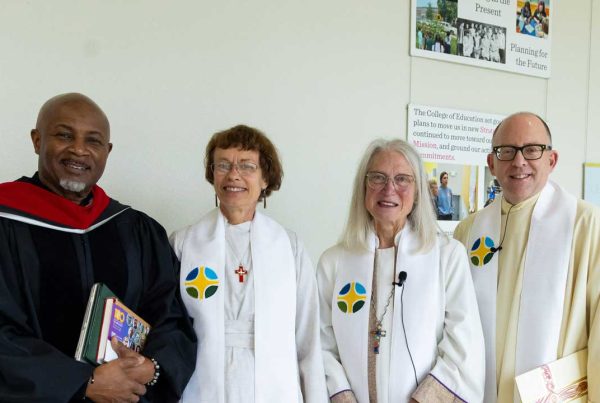Christian Nationalism Is Literally Killing Us
By: Christine Greenwald, ’16 MACMHC
Why would a religion founded by a man who died defenseless at the hands of the state, who preached messages of nonviolence and radical hospitality to others, be the very same religion promoting unfettered gun access in our country? A curious question, which I will explore today through the lens of Christian nationalism. My religious formation occurred in this kind of context before we had the phrase “Christian nationalism” to describe it, so consider this a critique from a former insider.
Christian nationalism has become part of our national parlance of late, as people become more aware of the ways the political ambitions of the far (and not-so-far) Right are intertwined with a Christian nationalistic agenda. How do we define Christian nationalism, though? Nationalism is seeing your country as superior to others and rooting for its own interests regardless of the impact on others outside your country. Christian Nationalism goes a step further, seeing one’s country — the USA, for our purposes — as a Christian nation and willing to do whatever it takes to keep Christianity in power and the superior force in the country (and in the world).
One small glitch, though: America is not a Christian nation. You can talk as long as you want to about “Judeo-Christian values” and how the Founders were all Christians like “we” are (the Founders weren’t, by the way), but freedom of religion is written into the constitution.
But never mind that inconvenient fact. Let’s explore how a religion founded on the teachings of Jesus could possibly be as fervently, feverishly, insanely pro-gun as it is today.
The myth of the persecuted minority
During the early years of Christianity, Christians were, indeed, persecuted. There are still Christians today, along with many other religious people, persecuted for their faith. But many American evangelicals misunderstand themselves to be persecuted when things like the First Amendment is applied to prohibit state-sponsored religion or things like compulsory prayer in public schools.
It’s a common sentiment of people who are used to having the most control or power and then suddenly need to share it. “But it’s not faaaairrrr!!”
Christian Nationalists want to claim both that our nation is and ought to be a Christian one, and at the same time it is a great injustice – a persecution, really! — that our nation is not more Christian than it already is.
I was born during Ronald Reagan’s last year in office – the president known for his quote that the nine most terrifying words in the English language are “I’m from the government, and I’m here to help.” Growing up, there was a strong sentiment that the government was the “bad guy.” Part of my family carries a strong libertarian streak, and many gun-rights fanatics carry this too.
Gun rights extremists often believe that they need to stockpile weapons made for war so that when the inevitable day comes when the government tries to seize their property (because socialism, which is communism, of course) and ruin their lives, they can fight back. Never mind the fact that the government will always be able to have more weapons than you and could come armed with tanks and missiles. These advocates insist on their right to own assault rifles to defend themselves against the ever-encroaching government.
Christian Nationalists take this sentiment and add a religious twist. These Christians believe themselves to be persecuted, often by a culture and government that is modernizing and secularizing too much for their taste. “They’ve taken the Christ out of Christmas!” “[Nuclear family, Heteronormative, Patriarchal] FAMILY VALUES!” “Critical race theory is making our white children feel guilty and hate America!” “America hates God! God loves guns! God loves people just like us!”
Of course they believe the government would come for them. Of course they need to arm and defend ourselves. Because What Would Jesus Do… right?!?
Slippery Slope Argument
If you have spent a short period of time as an evangelical discussing divisive issues like, you know, whether the Bible is literally word-for-word true, or whether homosexuality is an abomination, whether hell is real, or whether you should ever kiss your boyfriend in a dark car, you’re probably familiar with the slippery slope argument. First you take one step… then next thing you know, you’ve slid down the entire cliff and [lost your faith, lost your virginity, insert incredibly problematic life scenario here].
Likewise, with the issue of guns, they refuse to make any concessions about gun safety laws because of slippery slopes. The libs are coming for our guns! First they want universal background checks, next thing you know, they’ve abolished the Second Amendment, banned guns, and taken over everything! Rather alarmist. Meanwhile, innocent children, elders, and humans of every stripe are being slaughtered, but that never seems to be a pertinent data point for them.
I mean, they’re not wrong entirely. I slippery sloped my way straight from questioning whether being gay was really a sin to losing my faith of origin entirely. I’d also be fine with starting with universal background checks and then slippery sloping our way to making it very difficult to own guns. But who was asking me anyway, when a minority of voters control the decision-makers in the Senate, where a mere 41 out of the 100 senators get to decide what legislation gets passed?
Speaking of that whole persecuted minority thing… yeah, I don’t think they’re that persecuted.
Masculinity and Patriarchy Posing as Proper Religious Order
In Jesus and John Wayne: How White Evangelicals Corrupted a Faith and Fractured a Nation, Kristin Kobes du Mez explains in thorough details how white evangelicals evolved their faith to revolve much more around cultural conceptions of masculinity than about the actual teachings of Jesus (who, in case you didn’t notice, does not exactly come across as super macho and cowboy-like in most of the Gospels).
The John Wayne rendering of Jesus didn’t emerge from any honest, thorough reading of the Bible (outside of some choice passages mostly from Revelation and some verses in the Gospel where Jesus gets pissed off at people). It very much emerged from a cultural need to protect oneself from liberalizing values of society, the women’s liberation movement, and changing family structures.
As mentioned above, when a group in power begins to experience less power because they must share what they have, it can cause a panic. They mistake equality for oppression – and feel oppressed because they are no longer in control.
What they needed was a hero – a masculine representative to look up to. Their men were getting soft, and they needed strong, rugged, fierce individuals who would garner respect from women and other men. What was one great way to do that? Gun culture.
With a gun, you can be a man. You can be fierce and tough and defend your woman and your children. You can show the other boys that you are part of the boys’ club. And you can also kill people. Since 1982, 136 mass shootings have been carried out by men… and only 4 by women.
Perhaps in addition to problematic gun culture, we have a problem with what is happening with our boys and men? Call it toxic masculinity, call it patriarchal values, call it glorification of violence, call it whatever… there’s a clear problem.
Christian Nationalism has completely lost its way with regards to the “Christian” part. It requires some serious mind games and selective reading of the Bible to support a belief that humans are entitled to whatever weapons of war we can get our hands on. But Christian Nationalism has nothing to do with Christianity and everything to do with nationalism and maintenance of power and control. Of supporting a patriarchal society and a peculiar sort of theocracy that will eventually look more like Sharia law than the sort of Kingdom – place of Shalom – that Jesus was calling his followers to embody.
To learn more about Christine or read more of her writing about Recasting Religious Trauma, click here.






